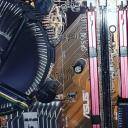Need help updating BIOS and setting XMP profile
-
Featured Topics
-
Topics
-
1
-
1
-
8
-
CDR_Xavier ·
Posted in Build Logs1 -
McBeth1087 ·
Posted in New Builds and Planning7 -
6
-
NamelessUser ·
Posted in Troubleshooting1 -
HereWeGo ·
Posted in Power Supplies3 -
Ariolander ·
Posted in Linux, macOS and Everything Not-Windows3 -
0
-


















Create an account or sign in to comment
You need to be a member in order to leave a comment
Create an account
Sign up for a new account in our community. It's easy!
Register a new accountSign in
Already have an account? Sign in here.
Sign In Now